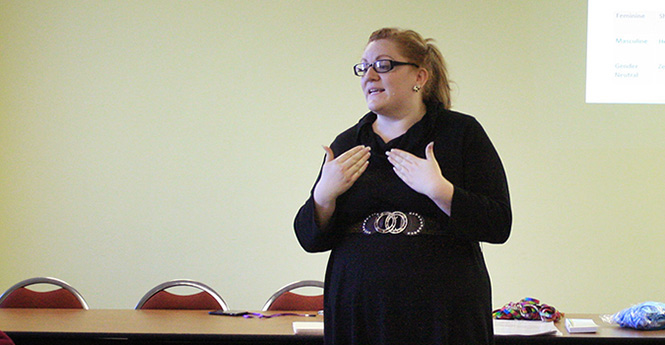Students learn LGBTQ terminology, awareness to become allies
Program Coordinator of the LGBTQ Student Center Roxie Patton provided a powerpoint presentation to RA’s and students about the importance of respect and awareness of gender equality on Tuesday Oct. 8, 2013. Photo by Emily Lambillotte.
Students gathered in the Student Center Tuesday for education and awareness of the LGBTQ community at Kent State’s “Safe Space” seminar.
“The idea behind the student Safe Space program was that we have mobile safe spaces,” said Roxie Patton, program coordinator of the LGBTQ Student Center. “We have people that are out and about assuring (LGBTQ) students that Kent State is a safe space and that we can tell (LGBTQ) students when they are coming here that we have students who are knowledgeable, students who care, students who are committed to equality. “
The event allowed more than 20 students to learn LGBTQ terminology, listen to a panel of LGBTQ students at Kent State and sign an ally pledge to receive a multi-color wristband, identifying him or her as an ally and mobile safe space for people in the LGBTQ community at the university.
“For many students, even if they never approach you when you, are wearing one of these wristbands, just seeing that, knowing that someone cared enough to find out about their identity and to support them is a big deal,” Patton said.
Many of the participants were residence assistants looking for an in-service training opportunity and to learn more about how they can assist residents who are also of the LGBTQ community.
“I’m excited (the RAs) are here and wanting to be powerful allies,” said Matt Musgrave, residence hall director of Centennial Court A and B.
The event started with Patton giving each participant either a blue, yellow, white or red star. Each corner of the room represented a friend, family member, career, community or dream.
Patton read a monologue describing the reaction each corner had on the individuals coming out as an LGBTQ member. Students either kept a corner from acceptance, folded away an uneasy support or tore off a corner that offered no support.
Patton then discussed the proper LGBTQ terminology including: sexual identities, sexual and romantic orientation, single- and multi-gender attraction, biological sex, gender, gender pronouns and gender expression.
“Our sex points to what’s between our legs,” Patton said. “Gender is what’s between your ears.”
Patton also went on to clear up terminology that is no longer accepted in the LGTBQ community.
Homosexual is no longer used, but rather gay is the accepted term. Hermaphrodite is only acceptable in medical use; the regular term should be intersex, and often the term transvestite is found derogatory among cross-dressers.
After describing LGBTQ terminology a panel of four men discussed their coming out experiences to students.
Panelist Shain Josef, junior business management major, said he had a difficult time after accidentally coming out to his mother when she saw his cellphone background of himself and his boyfriend. She didn’t talk to him for two weeks.
Not talking “was probably the hardest part because my mom is my go-to person,” Josef said. “She was what I had on the star.”
Eventually, Josef said his mother accepted him and became an ally.
Tyrone Larue Crew, panelist and junior applied conflict management major, had a more accepting experience, but was questioned with some misconceptions of being gay. Crew said he came out three years ago, and his mother’s biggest concern was if he would wear women’s clothing and change who he was.
“I told her, ‘I’m the way I am now, just now I’m gay. You just now know everything. I’m not going to change. I’m not going to be something totally different,’” Crew said.
All four panelists offered support and answered any questions students had of their experiences or terminology.
Students left the event with new knowledge of LGBTQ terminology and situations they can use to help other LGBTQ students. Dozens of students chose to sign the ally pledge and left with a wristband.
Safe Space “brings awareness to what is really out there amongst the people we interact with every day,” Crew said. “I think it is a peace-like action type of (training) because when you meet with someone different than you, you learn they have a different sexuality or a different whatever, (Safe Space) will teach you how to interact with them and to ask the right questions.”
Contact Carley Hull at [email protected].



